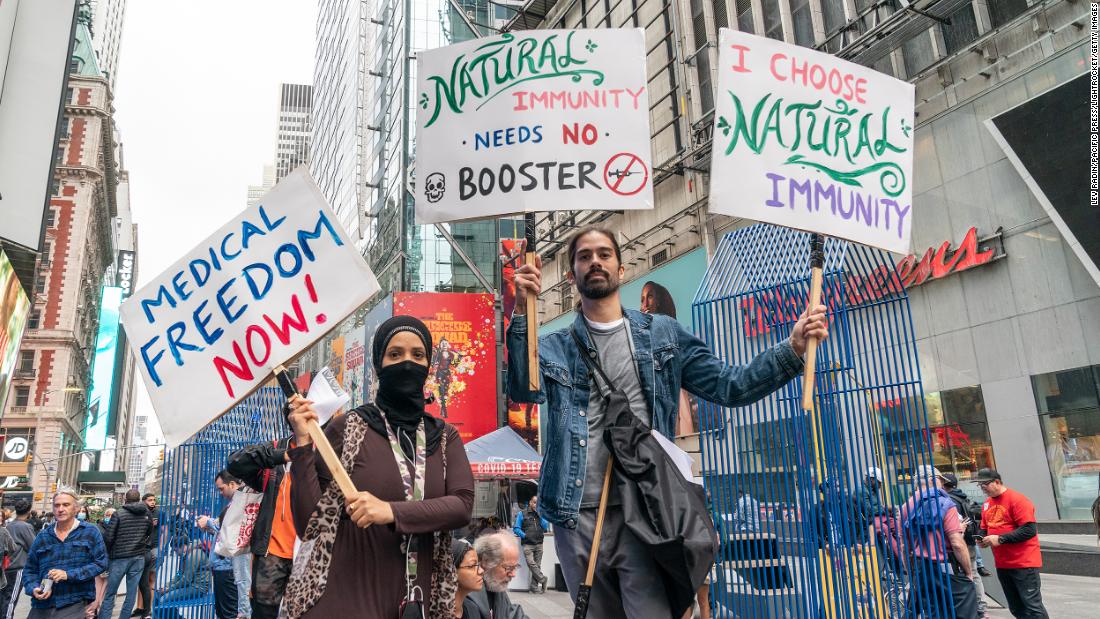(CNN) — Travis McAdam reviews local newspapers and extremist social media content, as well as receiving personal reports from community members about threats. Some reports detail the protests that swarm in front of the home of a Public Health official. Others describe hostile voicemail messages or emails sent to Health officials.
McAdam, an expert on extremism and white nationalism for the Montana Human Rights Network, has been monitoring threats of violence directed against Public Health officials in Montana and, at times, Northern Idaho.
Throughout the pandemic, these threats have become a national problem in the United States.
Dr. Anthony Fauci, director of the National Institute of Allergy and Infectious Diseases, has spoken openly about receiving death threats. Barbara Ferrer, Los Angeles County Director of Public Health, has also spoken about receiving hate mail and threats dating back to March of last year.
In Washington state, Okanogan County Community Health Director Lauri Jones said she installed a new security system and called for police patrols around her home after repeated threats online.
Investigators have also found that some of the threats against public health officials come from people with known ties to far-right groups.
Now, there is renewed concern that such bullying could increase across the country with upcoming efforts to vaccinate young children against COVID-19.
“There’s a chance that that ends up being one of these flash points where threats and harassment increase again,” McAdam told CNN. “Every time there is a new event during the pandemic, the possibility of bullying increases.”
“I can only imagine this will increase.”
The U.S. Food and Drug Administration is considering licensing the Pfizer / BioNTech covid-19 vaccine for children ages 5 to 11. With approval from the US Centers for Disease Control and Prevention, the vaccines could be administered next week.
Pending that clearance, Public Health officials plan to help vaccinate those minors, but their efforts could be accompanied by further threats and harassment from the small minority of Americans who are skeptical against vaccines or of covid-19.
“Unfortunately, I anticipate that this will be the case,” wrote Brooke Torton, a senior attorney for the Public Health Law Network, in an email to CNN. “I can only imagine that this will increase once younger children start getting vaccinated.”
Public Health officials continue to face threats for simply administering the vaccine due to widespread misinformation, Torton noted, and the idea of vaccine requirements has the potential to cause outrage among some parents.
Certain vaccine program managers have already experienced intimidating posts online during the pandemic, Claire Hannan, executive director of the Association of Immunization Managers, told CNN.
The association even discussed plans with some of its members to organize awards to doctors and community leaders for being “leaders” in vaccination, but some members expressed concern that such an award could lead to threats and harassment against the recipients, he said. Hannan.
“Those who speak out against vaccines and do that kind of harassment are still a very small minority, and I think it will continue to do so,” he said. “But every time there is a new initiative, or in this case, a new vaccine for children, then it is something that we have to consider that there is going to be a backlash from the anti-vaccine side.”
“The same professionals who are trying to protect us are being unfairly attacked”
Although Public Health officials have feared for their safety during the pandemic, harassment appears to increase each time new covid-19 mitigation efforts or policies are implemented, said Lori Tremmel Freeman, executive director of the National Association of County and City Health Officials (NACCHO) to CNN.
“At this point, things are so politically divided that I think any new initiative associated with this disease, any new effort to mitigate it, be it a vaccine or more use of masks in schools, etc., will be hyper-politicized,” Freeman said.
“It seems that the environment that we find ourselves in right now is conducive to people actually speaking their politics while ignoring health advice, which is just unfortunate,” Freeman added. “The very professionals who are trying to protect us are being unfairly attacked, and that is really a threat to all of us.”
Last week, NACCHO sent a letter to US Attorney General Merrick Garland, requesting “that he include the protection of officials and personnel of the Department of Public Health in his directive for federal authorities to meet with authorities. local, state, tribal and territorial to address the increased risk of harassment, intimidation and threats of violence against school-related personnel, ”reads the letter, signed by Freeman.
Freeman has yet to receive a response from Garland’s office, but said he wrote the letter because they don’t want to “wait until a tragedy hits to raise this to the highest levels” they can.
The letter noted that some health officials have had to start driving unmarked cars or installing home security cameras, others have had to rely on police escorts and 24-hour security, while others are concerned that their children are attacked.
“These threats have come at a price: at least 300 leaders from the Department of Public Health have left their posts since the pandemic began, affecting 20% of Americans. In many cases, they have been verbally abused and physically threatened,” according to the letter. “It is noteworthy that many of these threats have included misogynistic and racist overtones, further damaging these officials.”
Torton wrote in his email to CNN that the discussions he has had with Public Health officials across the country “certainly reveal a pattern of abuse directed at Public Health officials who are also women and racial, sexual and gender minorities” and “It seems that they are more likely to be a target.”
Torton was not involved in NACCHO’s letter to the US Attorney General.


